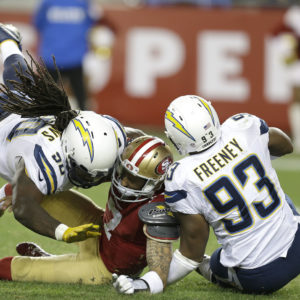Thirty years ago during an interview, John Carlos, who knows a fair amount about protests, national anthems, U.S. flags, raised fists and international controversies, told me that he didn’t hate his country in 1968.
So, why did he display a “Black Power” salute and bow his head on the medal stand during the playing of the U.S. national anthem after competing in the 200-meter dash at the Mexico City Olympics? That gesture resulted in his banishment from the Olympics Village, as he immediately was branded a pariah.
Carlos told me, “I love my country; it was about making my country better.”
That ’68 scene was during a time of Jim Crow segregation in many parts of the country, especially the Deep South, the aftermath of horrific assassinations of two men of peace — Dr. Martin Luther King Jr. and Robert F. Kennedy — and race riots in at least 100 cities and towns after the murder of King.
Presumably, NFL quarterback Colin Kaepernick maintained a similar mindset as Carlos when he initiated the kneel-down-for-the-anthem movement during the preseason of 2016.
However, don’t tell Vice President Mike Pence anything about good intentions. The former governor of Indiana abruptly left the San Francisco 49ers-Indianapolis Colts game Sunday, explaining in a statement afterward, “I left today’s game because President Trump and I will not dignify any event that disrespects our soldiers, our Flag, or our National Anthem.”
During the playing of the national anthem, at least 20 of the 49ers’ players, most of whom are black, kneeled. Then, Pence essentially said, “See y’all later.”
The message to NFL players from fans such as Pence appears simply to be this: You guys can beat your wives and girlfriends, drive while intoxicated, defy police officers, get arrested for everything from drugs to assaults on nightclub patrons to suspicion of murder, but don’t mess with our flag.
And don’t ever forget that.
Pence’s actions weren’t surprising, regardless of whether it was an orchestrated walkout by him and Trump. It’s truly amazing to this day that many people in the United States don’t understand the symbolic meaning of the U.S. flag to a broad swath of the country. That fervent pro-flag swath seems especially prevalent in Middle America — in other words, everything that isn’t the West Coast or East Coast.
If Hillary Clinton had understood that in 2016, she may have won the presidency.
Many states in Middle America, such as Ohio and West Virginia, have been deluged with a relentless opioid crisis and economic anxieties. For many of them, the flag represents a spiritual kinship to what they perceive as what’s right about America, what’s good about America. A positive symbol in the midst of despair.
Is kneeling disrespecting the U.S. flag, the military and the national anthem, as Pence declares? It depends on whom you speak — even among federal government types.
In 1948, Madeleine Albright was a refugee from the former Czechoslovakia. She later became the United States’ first female secretary of state. A couple of weeks ago at the annual Washington Ideas Forum, during a conversation with NBC News’ Andrea Mitchell before a packed audience, Albright told us:
“I think kneeling is a way of honoring America in a different way. I think what is great about America is free speech … (that’s) what America is about. America is freedom and diversity and respect.”
At the same event, during a conversation with CNN’s Jake Tapper, former CIA director and former general David Petraeus told us the other side:
“I’m disappointed that now we have politicized football. It’s a tough profession for those on the field. But it’s something that brought people together. … I just hope we can turn the volume down, turn the heat down.”
The climate surrounding the kneel-down, if not the message itself, has morphed into a boundless stage of ambiguity and amorphous activity.
Why are NFL players protesting these days? Is it because of Kaepernick’s original intention to garner attention toward what he termed police brutality, oppression against people of color and social inequality? Or is it because Donald Trump labeled NFL players who kneel during the anthem as “sons of bitches”?
Either way, there appears to be a disconnect.
Here are five hot points with Kaepernick
—Kaepernick acknowledged he didn’t vote in 2016.
—He wore socks featuring images of police depicted as pigs.
—He wore T-shirts featuring images of Fidel Castro.
—He posted messages on Twitter labeling police as a Runaway Slave Patrol.
—He donated money to a woman (a former Black Panther) who is a convicted cop-killer, escaped prison and found refuge in Cuba and remains a member of the FBI’s Most Wanted List, according to the U.S. edition of the Daily Mail, a British newspaper.
Not good optics, for sure.
This is the same Colin Kaepernick who painstakingly seeks a return to the NFL. But teams, thus far, have essentially answered the quarterback, even in silence, with a resounding “Hell, no. Don’t pass go.”
So, with that, what is the possibility of a game boycott by active black NFL players? As we said earlier, Carlos was a pariah in ’68; Kaepernick took the baton to the NFL in 2017.
O say can you see …

